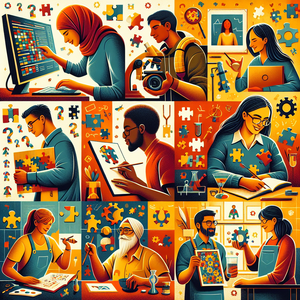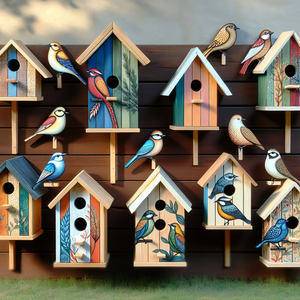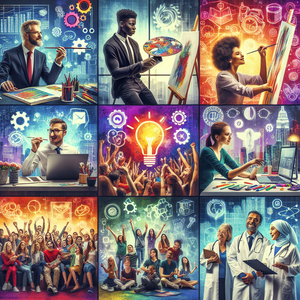The Impact of Clumsiness on Career Choices

Clumsiness can steer individuals toward certain careers while steering them away from others. For instance, someone who struggles with coordination might avoid roles that demand high levels of physical precision, such as surgery, professional sports, or fine arts. Instead, they may gravitate toward careers that value creativity, problem-solving, or verbal communication. Take the story of Sarah, an aspiring graphic designer who’s always felt like a bull in a china shop. Early on, she realized that her clumsiness made tasks like assembling intricate models or performing delicate art techniques frustrating. However, her knack for storytelling and visual communication led her to focus on digital design—an area that allowed her creativity to shine without the constraints of physical precision. Sarah’s struggles with clumsiness ultimately guided her to a fulfilling career where she could leverage her strengths rather than be hindered by her weaknesses. In contrast, roles that require meticulous hand-eye coordination, such as a surgeon or a fine artist, may pose insurmountable challenges for those who consider themselves clumsy. This natural inclination to avoid certain fields can lead to the emergence of new talents in areas that may not have been initially considered.
Navigating Challenges in the Workplace
While clumsiness can influence career choices, it also presents unique challenges in the workplace. For many, the fear of embarrassment or failure can be daunting. John, a marketing professional, reflects on his experiences: “I’ve knocked over coffee cups during important meetings and tripped over my own feet while presenting. At times, it felt like my clumsiness defined me, overshadowing my skills and contributions.” John’s experience is not unique; many individuals find themselves grappling with the perception of clumsiness. However, he found ways to adapt. He developed strategies to manage his clumsiness, such as organizing his workspace to minimize hazards and practicing mindfulness techniques to improve his focus. These adaptations not only helped him navigate his day-to-day tasks but also led to a deeper understanding of the importance of resilience and adaptability in the face of challenges. Moreover, businesses that recognize these challenges can foster inclusive environments by providing support systems, such as ergonomic workspaces or training programs focused on improving coordination and confidence.
Unique Strengths Cultivated Through Clumsiness
Interestingly, many individuals who identify as clumsy often develop unique strengths and perspectives as a result of their experiences. Their ability to laugh at themselves can foster a sense of humility and approachability, making them great collaborators. They may also cultivate creativity, finding innovative solutions to problems that others might overlook. Consider the case of Emily, a teacher who describes herself as "perpetually clumsy." Her frequent mishaps in the classroom—like spilling paint or tripping over supplies—have allowed her to create a supportive and empathetic environment for her students. She explains, “When kids see me mess up, they realize it’s okay to be imperfect. It encourages them to take risks and learn from their mistakes.” Emily’s clumsiness has not only shaped her teaching style but has also inspired her students to embrace their own failures as part of the learning process. Additionally, clumsy individuals often develop strong interpersonal skills. They may become adept at reading social cues and managing awkward situations, skills that can be invaluable in any career, particularly in roles that require teamwork and collaboration.
Clumsiness, often viewed as a disadvantage, can significantly impact career choices and trajectories. While it may present challenges in the workplace, it can also lead to unexpected strengths and opportunities. By embracing their clumsy traits, individuals can carve out unique paths that allow them to contribute meaningfully while fostering resilience and creativity. Ultimately, the stories of those who navigate their clumsiness serve as a testament to the power of self-acceptance and the importance of finding a career that aligns with one's true self—clumsiness and all. As society continues to evolve, it is essential to recognize that every individual has unique qualities that can contribute to their success in the workplace. Clumsiness, when embraced, can lead to a fulfilling career that celebrates diversity in skills and experiences, highlighting the fact that perfection is not a prerequisite for success.
User Experience (UX) Designer
Tech companies like Google, Apple, and startups in the software industry
Core Responsibilities
Conduct user research to identify pain points and preferences, focusing on intuitive design to accommodate users who may struggle with coordination.
Create wireframes and prototypes that prioritize ease of use and accessibility, ensuring that digital products are navigable for all skill levels.
Collaborate with developers and stakeholders to implement design solutions while conducting usability testing to refine interfaces.
Required Skills
Proficiency in design tools such as Sketch, Figma, or Adobe XD.
Strong understanding of human-centered design principles and accessibility standards.
Experience in user testing methodologies and feedback analysis.
Creative Content Writer
Marketing agencies, publishing companies, and digital media firms
Core Responsibilities
Develop engaging content for various platforms such as blogs, social media, and marketing campaigns while emphasizing storytelling that resonates with diverse audiences.
Collaborate with marketing teams to create content strategies that highlight product features and address customer needs, particularly for those who value creativity over precision.
Edit and proofread content to ensure clarity, coherence, and alignment with brand voice.
Required Skills
Exceptional writing and communication skills, with a knack for adapting tone and style for different audiences.
Familiarity with SEO best practices and social media trends to enhance content visibility.
Ability to work under tight deadlines while maintaining quality and creativity.
Art Therapist
Hospitals, mental health clinics, rehabilitation centers, and community organizations
Core Responsibilities
Use artistic methods to help clients express emotions and cope with challenges, providing a safe space for exploration without the pressure of perfection.
Assess client needs and develop personalized treatment plans that utilize various art forms, accommodating different levels of artistic ability.
Facilitate group and individual sessions, guiding clients through creative exercises that promote emotional healing and personal growth.
Required Skills
A degree in art therapy or a related field, along with licensure or certification in therapeutic practices.
Strong interpersonal skills for building rapport with clients and fostering a supportive environment.
Knowledge of psychological principles and art techniques to effectively integrate into therapy.
Project Manager in Creative Industries
Advertising agencies, film production companies, and design firms
Core Responsibilities
Oversee creative projects from conception to completion, ensuring that teams are organized and deadlines are met while accommodating diverse working styles.
Coordinate with cross-functional teams, including designers, writers, and developers, to align project goals and expectations.
Manage budgets and resources efficiently, adapting plans as needed to address any unforeseen challenges that arise during the project lifecycle.
Required Skills
Strong organizational and leadership skills, with the ability to motivate teams and manage time effectively.
Proficiency in project management tools like Asana, Trello, or Microsoft Project.
Excellent communication skills to articulate project goals and resolve conflicts.
Human Resources Specialist
Corporations across industries, non-profits, and educational institutions
Core Responsibilities
Develop and implement training programs that foster inclusive workplace environments, recognizing diverse employee needs, including those who may struggle with coordination.
Manage recruitment processes, from job postings to interviews, ensuring a focus on candidates’ unique strengths and contributions.
Address employee concerns and mediate conflicts, promoting a culture of support and understanding within the organization.
Required Skills
Strong knowledge of employment laws and human resources best practices.
Excellent communication and interpersonal skills, with the ability to empathize and connect with individuals from various backgrounds.
Experience with HR software and data analysis to improve HR processes.


